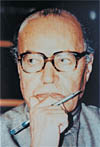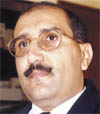Nabeel Hizam: “It is very important to establish an active theatrical movement in Yemen.” [Archives:1998/05/Interview]
Nabeel Hizam Mansoor is an outstanding actor and a member of the National Theater Troupe. He started acting in 1975, and went on to play in the theater and TV. Having taken part in several training courses in Tunisia, Iraq and Syria, Nabeel, 34, participated with his theatrical troupe in many Yemeni, Arab and international theater festivals. He has recently participated in the Cairo Experimental Theater Festival with a play based on a new adaptation of Dostoevski’s Crime and Punishment. The play was received very well by Egyptian and Arab theater critics. Dr. Salah Haddash met Mr. Nabeel Hizam and filed the following interview.
Q: How did you start acting? A: It was by sheer chance. As a boy, I used to very much enjoy watching adventure and western movies. In 1975 an advert appeared on the Yemeni TV looking for people with potential acting talents. I applied along with 275 others when I was still 9 years old. I was auditioned by the Palestinian director Hussain Al-Asmar who was working in Yemen at the time. Out of the 15 people who were chosen, I am the only one who remains in this business to this day, while, the others have drifted away and gone into commerce or other businesses of their own.
Q: Did you get any academic training? A: Well, after graduating from secondary school, I studied theater in Sanaa for three years, and for four years later at the Aden Institute of Fine Arts.
Q: What is the difference between the Sanaa and Aden institutes? A: The only difference is that the Aden Institute of Fine Arts was established on sound academic basis, the reason why it is functioning to this day. The Sanaa institute, on the other hand, seemed to have been established to train just a batch of students, and that is it. This is what actually happened, and the institute was later closed. Several of the Aden graduates went on to do higher studies, and returned to teach at the same place.
Q: What do you think made the other people leave the theater? A: I believe it is primarily a personal thing. It depends on whether you have a total conviction and believe in the cause, because I believe that acting is not just a mere career. You must also have a worthy cause to adhere to. Some people use acting and entertainment in general as a vehicle to gain fame, then they abandon it once they get the right connections to help them further their other businesses. Other people, like me, have real love for this art. There are great artists in Sanaa, Aden and other governorates, but they go to opportunities to appear and excel in their work. These people, however, are often overshadowed by the opportunists who use art as a vehicle for furthering their own selfish aims.
Q: Are you actually a government employee? A: Officially, I am an employee of the Ministry of Culture getting a monthly salary that is not sufficient to pay the house rent. But I make extra money from working in radio and TV which help a little bit. Artists in Yemen are still regarded as inferior beings, both by officialdom and by society in general; while, their counterparts in the Gulf countries are treated far better . More respect and sympathy should be accorded to Yemeni artists so that they can better serve their society.
Q: Have you worked outside Yemen? A: I worked in several Arab countries, but I don’t like to stay away from my country for a long time – 6 or 7 months maximum. I had opportunities to work in Egypt, Syria, and Kuwait. I just couldn’t leave Yemen. We take part in Arab theater festivals for the purpose of meeting and getting to know other artists as well as being known ourselves. We gain a lot of experience and knowledge of art in these international events.
Q: What is the most memorable play you took part in ? A: I consider “The Donkey and the Mirror,” written by Dr. Abdulghafar Makkawi, who teaches at Sanaa University and directed by Safwat Al-Rashed, as one of the best plays I acted in. It is a tragi-comic play, which was performed at the Carthage Theater Festival in Tunisia. I was nominated for the Best-Actor award at the festival, but, I am sorry to say, many of these events have become politicized. Creativity is no longer the primary criteria. We also performed this play in other Yemeni governorates and at the Arab Theater Festival in Baghdad.
Q: Is there an appreciative theatrical audience in Yemen? A: The Yemeni audience is the most faithful to the Yemeni artists. But we, as a public sector theater, are the reason behind the discontinuity. An audience must be educated to appreciate theater and make it a part of its cultural life. Like, thinking of getting the daily necessities, a person must also think of taking his family to the theater. We present a theatrical performance every 6 or 7 months and then stop for a year or two! Such interruptions makes the audience lose faith in us. We are now trying, with modest resources, to present good-level drama for young people.
Q: Does the Yemeni TV show your plays? A: No, the Yemeni TV only shows the plays that are imposed on us by the Ministry of Culture. Such plays are often shot in a hurry as if the aim is to distort Yemeni drama and Yemeni actors. The better plays are filmed, but left to rot in the TV archives. The Donkey and the Mirror is a good example on that. Despite it being a great play with not much political content, it is still shelved.
Q: What about the radio? Is it the same story? A: A lot of credit must go to the radio. We have been able to present many good radio plays and drama serials with good artistic value and human interest. National and religious occasions take up much of the work. The amount of drama presented during Ramadhan, for example, is equivalent to what is presented throughout the whole year. Work presented on national occasions is usually tailor made for that occasion only and cannot be shown on ordinary days.
Q: What can you suggest to improve the situation? A: First and foremost, the Ministry of Culture and the government in general have to believe in the importance of establishing a good theatrical movement in Yemen. I mean the Ministry of Culture consists of the directorates of theater, music, folklore arts, publications, etc. It has no other job but to manage these elements, and manage them well. Otherwise, what is the use of having a whole ministry devoted to culture? They have the necessary finances to fund plays, TV serials, etc.
Q: Is lack of financial resources an obstacle? A: The available funds are, unfortunately, often put in the wrong places. The administrative staff is usually not doing its job properly.
Q: Can the private sector take part in presenting good drama? A: The private sector, if it participates at all, usually pays pittance. There are, however, theatrical groups of enthusiastic young people who rely on their own meager resources to present excellent plays to an appreciative audience. But all these efforts remain on an individual basis. Due to the lack of ample resources, they never progress beyond one or two drama works with long intervals of inactivity in between. Private investors want a quick and large return for their money, a thing which is not readily achievable in the theater. We’ll have to wait for entrepreneurs or impresarios, if you like, who actually love art and are willing to be content with small income at the beginning.
Q: Is there any school theater in Yemen at all? A: No. There are very few teachers who are trained to instruct our children in the arts. If there is any school theater at all, then it is simple, and is often conspired against by the backward elements in our society. Artists and audiences alike are supposed to be educated from childhood while still at school, along with learning other subjects such as science and math. People should learn to have an artistic taste early in their lives.
Q: Any last word? A: I hope that our audience will excuse us for failing them, sometimes. I also hope that the Ministry of Culture will be fully aware of the importance of art in general and the theater in particular.
——
[archive-e:05-v:1998-y:1998-d:1998-02-02-p:./1998/iss05/intrview.htm]


